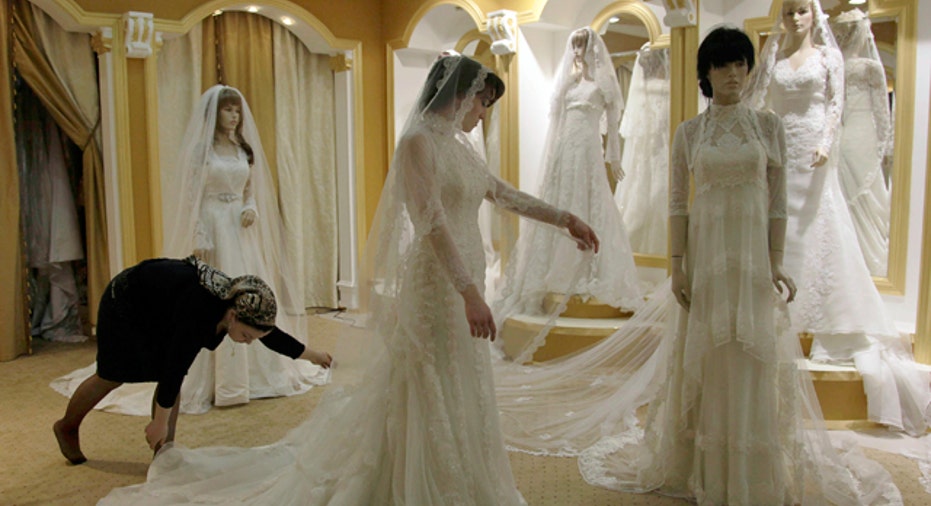Lifting the Veil on Wedding Spending

All eyes may be on the wedding about to take place across the pond, but brides and grooms on this side of the Atlantic appear to be enjoying fairytale weddings of their own -- and they’re coughing up big bucks for them.
A new survey by the Knot.com reveals that the average cost of a wedding in the U.S. was $26,984 in 2010 -- 5% less than a year before, but hardly chump change. Even in these challenging economic times, less than a third of the nearly 19,000 brides polled said the economy crimped their wedding budgets; in fact, 20% of them spent more than $30,000 on their weddings and 12% spent more than $40,000, not including the engagement ring or honeymoon.
“Brides remain committed to planning a luxurious, memorable event and are willing to spend despite the state of the economy,” says Carley Roney, TheKnot.com’s editor-in-chief, who adds that 42% of brides went over budget last year.
It’s hard to pinpoint the exact moment that weddings and the expenses associated with it took on a life of their own, but it’s happened, and consumers are paying up. Even the most money-conscious brides-to-be aren’t immune: Farnoosh Torabi, a personal-finance expert with Credit.com and author of “Psych Yourself Rich”, says her mentality of “save, save, save” has come under pressure as she plans her June 2012 wedding.
“It really is you against the $40 billion wedding industry,” she says. “When you’re planning a wedding, it’s very emotional, and [the industry] plays off of those emotions.”
But it’s not just the industry. While it certainly is a reality that a bakery can charge 50% more for any cake just by calling it a wedding cake, Torabi says it’s also true that couples fail to leave themselves enough time to do research and negotiate with vendors.
“The more time you give yourself, the more you can price compare and negotiate and get the deals that you want,” she says, arguing that waiting until the last minute leaves you at the mercy of the vendor and reduces your chances of getting a discount.
In addition, Torabi says couples too hastily forego cash-saving options (such as a buffet as opposed to a sit-down dinner) with the mindset that their wedding needs to be the ultimate lavish affair.
“We are often blinded by what we think is ‘the best’ and what we need. You’re not getting wedding; you’re getting married. Your wedding is one night; your marriage is, hopefully, an eternity,” she says.
But couples who are cutting costs are more likely to cut back on the number of guests at their wedding than they are on the quality of the experience, according to Roney at TheKnot.com.
“In 2010, the average number of wedding guests was 141, compared with 149 in 2009. Interesting enough, despite the decrease in wedding guests, wedding standards weren’t affected, as the average wedding spend per guest remained the same as it was in 2009 -- $194,” she says.
Tammy Cunningham, founder of wedding-planning company Sincerely Yours Events, says she saw greater interest in smaller, more intimate affairs last year, but has noticed a rebound in larger affairs this year.
“Some couples we spoke with last year opted to move their weddings into 2011, giving them additional time to save more for the actual expenses involved, as well as to get a better handle on whether the economy would actually rebound as predicted,” she says.
As a wedding planner in the Long Island area of New York, Cunningham is in a sweet spot. The average wedding budget for couples in that region is $51,811* -- a figure trumped only by couples in Manhattan, who spend an average of $70,730*. (Indeed, Cunningham is currently working with a client who has a 300-person guest list and a budget of $175,000, but says her typical wedding is in the 200-guest, $50,000 range.)
More interesting, though, is the fact that what was once a luxury is now a near necessity. According to TheKnot.com, one in three couples now uses a wedding planner, and while they may come at an additional expense, Cunningham says planners’ vendor relationships and budget skills can be money savers.
Perhaps the biggest benefit to the couple, though, is the assurance that the event -- for all of the time and money that has gone into planning it -- will go off without a hitch.
That, she says, is a “priceless commodity.”
Courtesy of TheKnot.com
*Figure does not include the cost of the honeymoon.



















